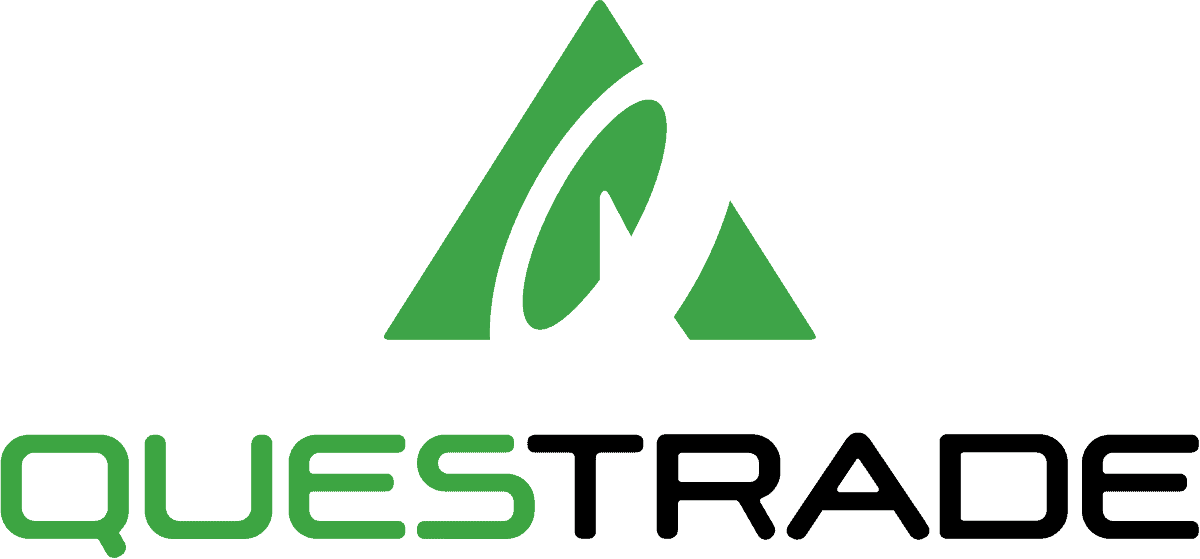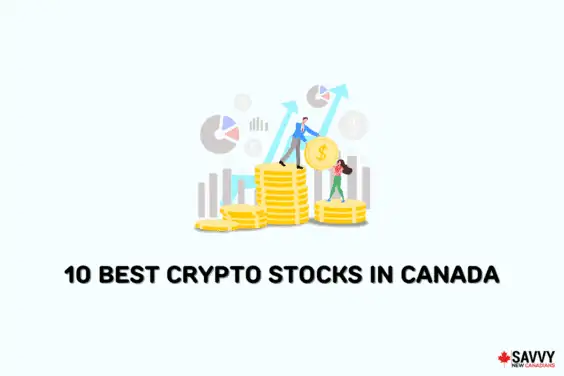Online discount brokerage platforms like Questrade and RBC Direct Investing help self-directed investors take ownership of their investment portfolios.
These trading platforms can be used to trade various investment securities from the comfort of your home, whether you have some experience with the stock markets or are a novice.
While brokerages often provide similar services, Questrade beats RBC Direct Investing in some areas, including trading fees – a key factor when you are trying to maximize returns.
This RBC Direct Investing vs. Questrade comparison covers their features, account and product offerings, fees, pros, cons, promotions, and more.
What is Questrade?
Questrade

On Questrade’s Website
- Fees: $4.95 to $9.95 per trade
- Account minimum: $1,000 to start trading
- Promotions: Get $50 in free trades
Questrade is an online brokerage platform founded in 1999.
It is quite popular for disrupting Canada’s DIY investment landscape with its low-cost trading fees and robust selection of investment products.
As of this writing, the company had over $30 billion in assets under administration and attracts over 200,000 new client accounts yearly.
Questrade has been named one of Canada’s Best Managed Companies nine times in a row.
In addition to self-directed trading services, Questrade also offers a diversified low-fee portfolio managed by experts via Questwealth portfolios.
When you open a new Questrade account using our exclusive referral link or code (SAVVY50), you get $50 in free trades after depositing $1,000 or more.
What is RBC Direct Investing?
RBC Direct Investing

On RBC’s Website
- Fees: Fees of $9.95 per trade or $6.95 for active traders
- Account minimum: $15,000 minimum to avoid fees
- Promotions: Sometimes available
RBC Direct Investing is a division of the Royal Bank of Canada (RBC).
RBC is one of the largest banks in the world. It has been around since 1864 and has over 17 million clients in Canada and 28 other countries.
The RBC Direct Investing platform is available through a web interface and iPhone and Android mobile apps.
Questrade vs. RBC Direct Investing
Below, I summarize how both platforms compare in ten different areas.
1. Investment Accounts Offered
Both Questrade and RBC Direct Investing offer registered (tax-advantaged) and non-registered accounts, including:
- Tax-Free Savings Account (TFSA)
- Registered Retirement Savings Plan (RRSP)
- Registered Retirement Income Fund (RRIF)
- Registered Education Savings Plan (RESP)
- Margin account
- Corporate accounts
Questrade clients can also open LIRA, LRSP, LIF, Investment Club, FOREX, and CFD accounts.
2. Investment Products
When selecting a discount broker, it makes sense to go with one that offers a variety of products so you can diversify your holdings easily in one place.
Questrade offers a wider selection of assets, including stocks, Exchange-Traded Funds (ETFs), mutual funds, options, bonds, Guaranteed Investment Certificates (GICs), foreign exchange, precious metals, and contracts for difference (CFDs).
RBC Direct Investing offers stocks, ETFs, mutual funds, options, bonds, GICs, precious metals, and an investment savings account.
3. Commission-Free ETFs
Commission-free trading is a lot more common in the United States than it is in Canada, where only a few online brokerages offer this perk.
Questrade supports free ETF purchases (US and Canada-listed ETFs) and has a flat-rate trading fee for all ETF transactions (buy and sell orders).
This means that you can save up to $9.95 per transaction when you purchase ETFs via the Questrade platform.
4. Trading fees
What it often comes down to when choosing between trading platforms that offer identical services is the fees.
That is, how much are you paying per transaction, and how does it compare with the best offers available?
Below is a comparison of trading fees between Questrade and RBC Direct Investing:
| Trading Commissions | Questrade | RBC Direct Investing |
| Stocks | 1 cent per share ($4.95 minimum to $9.95 maximum per transaction) | $9.95/trade |
| ETFs | Free to buy; $4.95-$9.95 when you sell | $9.95/trade |
| Options | $9.95 + $1 per contract | $9.95 + $1.25 per contract |
| Mutual funds | $9.95/trade | No commissions to buy, sell or switch. Early redemption fees may apply |
| Precious metals | $19.95 USD/trade | $28.95 + $1/oz gold certificates; $28.95 + $0.10/oz for sliver certificates (USD) |
| Active Investor pricing (stocks and ETFs) | $4.95/trade | $6.95/trade |
| Active Investor pricing (options) | $4.95 + $0.75 per contract | $6.95 + $1.25 per contract |
Active trader pricing is unlocked when you subscribe to an advanced market data package on Questrade. For RBC Direct Investing, you must place at least 150 trades per quarter to qualify.
5. Administrative Fees
Both Questrade and RBC Direct Investing charge a service fee when you transfer your account to another financial institution. There are also fees for NSF cheques, wire transfers, certificate deposits, and estate account processing.
In addition, RBC Direct Investing charges a quarterly maintenance fee of $25 if your account asset balance is less than $15,000. You can have this fee waived under some circumstances.
6. Trading Platforms and Tools
You can access both Questrade and RBC Direct Investing through their online sites (web interface) and mobile apps.
Active traders can access “Trading Dashboard” on RBC Direct Investing for increased customization, level 2 quotes, advanced charting, and real-time streaming quotes.
Questrade’s IQ Edge, a desktop platform, also offers advanced order types for experienced traders.
For research tools, RBC Direct Investing has screeners, sector analysis, watchlists, RBC affiliate research, and third-party research reports from Morningstar.
Questrade offers investment reports, watchlists, alerts, and access to Intraday Trader, a tool that alerts you to new trading opportunities throughout the day.
Questrade clients also have access to a rebalancing tool (Passiv) and a net worth and investment tracking dashboard (Wealthica)
7. Minimum Investment
RBC Direct Investing does not have a minimum investment amount to begin investing.
For Questrade, you need to fund your account with at least $1,000 to get started.
8. Are they Safe?
Questrade and RBC Direct Investing are both members of the Canadian Investor Protection Fund (CIPF). This membership means your investment assets are protected up to $1 million should the firms become bankrupt.
Both companies are also regulated by the Investment Industry Regulatory Organization of Canada (IIROC).
RBC Direct investing clients enjoy the stability of a bank over 150 years old and the largest in Canada.
Questrade clients are protected with an additional $10 million in private insurance.
9. Promotions
New Questrade clients who sign up using our referral link or referral code (SAVVY50) get $50 in free trade credits.
RBC Direct Investing does not appear to offer a comparable promotion as of this writing.
10. Other Features
If you prefer to have professionals manage your portfolio at a low cost, Questwealth Portfolios, a robo-advisor service operated by Questrade Wealth Management Inc, could be for you. You can invest up to $10,000 free for one year here.
RBC’s robo-advisor service is referred to as RBC InvestEase.
Pros and Con of Questrade
Questrade users enjoy these benefits:
- Low and competitive trading fees
- No-commission ETF purchases
- Multiple investment product options and accounts
- Transfer fees are waived up to $150 when you move your investment to Questrade
- No quarterly maintenance fees
- Competitive active trader pricing
- Versatile mobile and desktop apps
- Free trade credits when you sign up using a valid promotional link or code
Cons
- You need a $1,000 minimum deposit to begin investing on the platform.
Pros and Cons of RBC Direct Investing
The platform is owned by Canada’s largest bank, and clients also enjoy:
- Access to various investment products and accounts
- Versatile mobile app with access to all your accounts in one place
- Covers transfer fees when you move assets worth $15,000 or more
- Offers in-depth educational resources and tools
- Has a practice (demo) account
Cons
- You pay a quarterly maintenance fee of $25 if your account balance is below $15,000
- Trading fees are on the high end of the spectrum
- Does not offer free ETF trades
Questrade vs. RBC Direct Investing vs. Wealthsimple Trade
| Questrade | RBC Direct Investing | Wealthsimple Trade | |
| Stock trading fee | $4.95-$9.95 | $9.95 | $0 |
| ETF trading fee | Purchases are free; $4.95-$9.95 to sell | $9.95 | $0 |
| Options trading fee | $9.95 + $1/contract | $9.95 + $1.25/contract | N/A |
| Active trader fee (stocks/ETF) | $4.95 | $6.95 | N/A |
| Minimum investment | $1,000 | None | None |
| Investment products | Stocks, ETFs, options, mutual funds, bonds, IPOs, precious metals, FX, GICs | Stocks, bonds, options, mutual funds, bonds, GICs | Stocks and ETFs |
| Account maintenance fee | $0 | $25/quarter if balance <$15,000 | $0 |
| Transfer-in fees waived? | Up to $150 | Up to $200 if assets $15,000+ | Up to $150 if assets $5,000+ |
| Promotions | Get $50 in free trade credits | N/A | Get a cash bonus |
Questrade vs. RBC Directing Investing Conclusion
Overall, Questrade wins this comparison review with RBC Direct Investing.
While both platforms work well for newbies and experienced DIY investors, Questrade has the upper hand when you look at some key benefits: low trading fees, no account maintenance fees, and zero-commission ETF trades.
If you are opening a new Questrade account, get $50 in free trades here.







